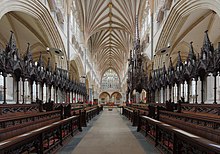Thomas Bitton
Thomas Bitton (also Button ) († September 21, 1307 in Bishop's Clyst , Devon ) was an English clergyman. From 1292 he was Bishop of Exeter .
Origin and promotion to bishop
Thomas Bitton was a son of Sir Adam Bitton from Bitton in Gloucestershire . His brothers included William Button , who was Bishop of Bath and Wells from 1267 until his death in 1274. His uncle of the same name, William Button, was also Bishop of Bath and Wells from 1247 until his death in 1264, while another uncle, John Bitton († around 1273) was provost of Wells Cathedral . Bitton was also related to Walter Giffard , the former Bishop of Bath and Wells and Archbishop of York. Since he was labeled a Masters , he had apparently studied, presumably at Oxford University . Through his family contacts, he became the Precentor of Wells Cathedral. He gave up this office in 1268 when he became Precentor of the Archdeacon of Wells . In 1284 or 1285 he became dean of Wells Cathedral. Through the influence of his relative Walter Giffard, he received two benefices at York Minster . Finally, in October or November 1291, he was elected bishop of the Diocese of Exeter . On November 30th the election of King Edward I was confirmed and on December 2nd the temporalities were given to him . He was ordained bishop on March 16, 1292 in Canterbury Cathedral.
Bishop of Exeter
There is no record of Bitton's fifteen-year tenure as bishop , but it appears he was a dutiful bishop. He sponsored Walter Stapeldon and James Berkeley , who later became Bishops of Exeter themselves, and supported the rebuilding of Exeter Cathedral by introducing a tariff that brought in over £ 124 a year. During his tenure, the cathedral choir was largely completed. According to John Leland , he is said to have sponsored the construction of the Franciscan branch in Exeter. In 1294 Bitton made a visitation to the collegiate church of Bosham in Sussex , which was under the control of the Bishops of Exeter. He ordered some spiritual reforms. In 1304 he drafted statutes for the Collegiate Church of Crediton in Devon. In 1301 King Edward I claimed the collegiate church of St Buryan in Cornwall as a royal chapel, thereby removing it from the episcopal control. Despite his opposition, Bitton eventually had to accept this. In his native Bitton, he donated a chapel, which was added to the north side of the church and in which his parents were buried.
Bitton died on his episcopal estate Bishop's Clyst in Devon and was buried on September 25, 1307 in Exeter Cathedral. During construction work in the cathedral, his grave was opened in the choir room in 1763, a chalice and its ring were removed from the grave, which are still kept in the cathedral today.
Aftermath
The value of Bitton's portable possessions was over £ 5,395. According to his will, much of it was distributed to monasteries in his diocese, to hospitals and to leprosy houses. To this end, he had given donations to numerous people, and he had earmarked other funds for the maintenance of bridges. His successor Walter Stapledon used part of his fortune to found the Clyst Gabriel Hospital near Exeter. Stapledon probably tried to promote the worship of Bitton by calling on all clergymen to pray for Bitton's salvation and granting indulgences for it . In 1312 four other bishops in England and Wales made similar indulgences, but Bitton was never given any appreciable veneration.
literature
- William Hale Hale, Henry Thomas Ellacombe: Account of the executors of Richard, bishop of London, 1303, and of the executors of Thomas, bishop of Exeter, 1310 , Camden Society, Westminster 1874
Web links
- Nicholas Orme: Bitton, Thomas (d.1307). In: Henry Colin Gray Matthew, Brian Harrison (Eds.): Oxford Dictionary of National Biography , from the earliest times to the year 2000 (ODNB). Oxford University Press, Oxford 2004, ISBN 0-19-861411-X , ( oxforddnb.com license required ), as of 2004
| predecessor | Office | successor |
|---|---|---|
| Peter Quinil |
Bishop of Exeter 1292-1307 |
Walter Stapeldon |
| personal data | |
|---|---|
| SURNAME | Bitton, Thomas |
| ALTERNATIVE NAMES | Button, Thomas |
| BRIEF DESCRIPTION | English clergyman, Bishop of Exeter |
| DATE OF BIRTH | 13th Century |
| DATE OF DEATH | September 21, 1307 |
| Place of death | Bishop's Clyst |
